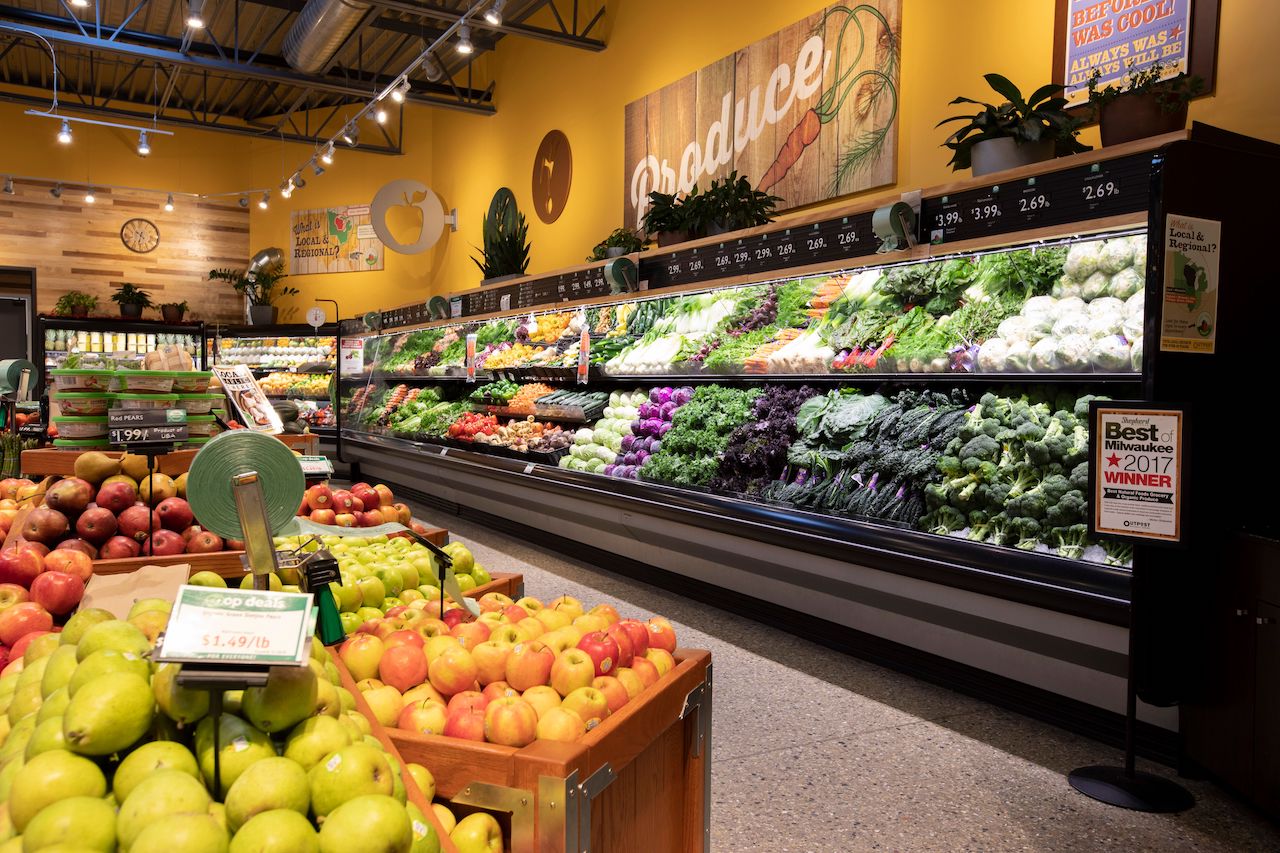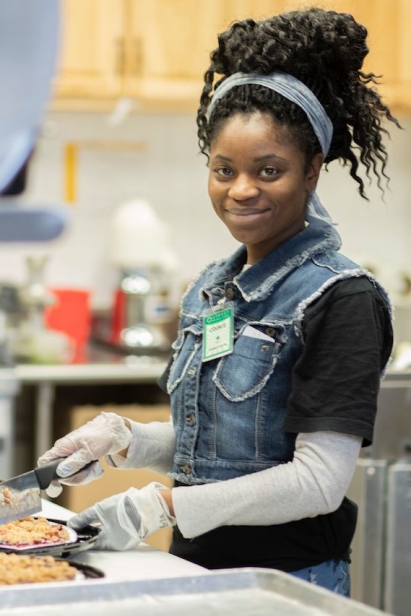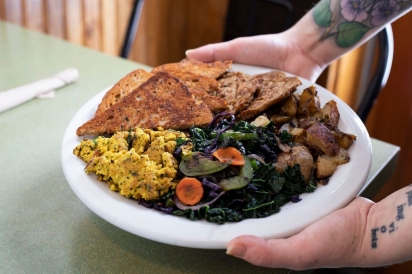Co-op Culture
Before Whole Foods began its takeover across the country, and long before conventional grocery stores stocked organic produce, co-ops ruled the natural foods landscape. From their beginning in the 1960’s and 1970’s, modern food coops were developed by (and catered to) vegetarians and health-conscious shoppers who wanted wholesome and responsibly-sourced food. This earned co-ops a reputation as havens for hippies, but as popular interest in food quality and production has grown over the years, the natural foods label has lost some of its rebellious and crunchy edge.
Now, shoppers can walk into nearly any traditional grocery store or even Walmart—and fill a cart with some of the same vegetarian and organic items that were once only available at co-ops. That could have spelled doom for co-ops, but places like Outpost Natural Foods and Riverwest Co-op Grocery & Café are still going strong because they offer more than just food—they offer community.
Unlike traditional grocery stores, co-ops use an anti-corporate business model that allows customers to become owners through the purchase of shares. Owners get a say in how the store is run, and any profit that isn’t reinvested in the business is returned to them. This model also means that co-ops put energy into improving their communities, because their owners are the community. Co-ops organize volunteer activities, partner with food pantries and make business decisions with their impact and footprint in mind.
Co-ops aren’t just local businesses either. At their core, coops and their owners are activists committed to environmental and social justice. By putting people and practices before profit, they offer space and opportunity for any shopper who cares about responsible food production to put their money, quite literally, where their mouth is. More widely-distributed natural foods might appear to disrupt the bread-and-butter of food co-ops, but as customers become increasingly aware of the issues surrounding our industrial food cycle, co-ops stand ready to offer sustainable alternatives.
Milwaukee’s largest food co-op, Outpost Natural Foods, started in 1970 like many others, with a group of people who wanted to buy natural foods, buck the corporate business model and serve their neighborhood. These days, Outpost looks a bit more like a traditional supermarket—and with four full-service locations and 500 employees, it might feel more like one in some ways, too—but don’t let the name tags and size fool you. Outpost is still member owned and controlled, and it offers its 22,000 owners a lot more than natural foods.
If the layout feels traditional as you make your way from produce to meat counter to dairy, a closer look makes it abundantly clear this isn’t Kroger. Signs throughout the store call attention to local and regional products, with information about the vendors and their practices. The best part about Outpost’s close connection to its vendors is that shoppers can feel confident that the products have been researched and tested to meet basic guidelines and quality standards. Outpost’s crown jewel, however, might be its bulk foods aisle: bins loaded with organic grains, dried beans, pasta, herbs, spices and much more offer a dizzying number of affordable, organic and eco-friendly options.
Outpost’s commitment to community is true to its origins. In recent years, Outpost has doubled down on its sustainability initiatives, installing solar panels at its Mequon store, composting scraps from its kitchen, offering recycling instore and more. During the growing season, Outpost locations serve as CSA (Community-Supported Agriculture) drop spots for farms like Tipi Produce in Evansville, WI, but you’ll also find their fruits and veggies neatly stacked for sale in the store.
Outpost’s Fork Café features fresh soups, a homemade bakery and a delicious range of affordable sandwiches in a friendly setting, while events like the Makers Market—which brings in small, local vendors who engage directly with Outpost’s customers—keep the store’s sense of community strong.
Opened in 2001, the Riverwest Co-op on Clarke and Fratney might be a baby compared to Outpost, but its atmosphere and structure are closer to the modern co-op’s 1970’s roots. The volunteer-run store stocks a small but complete selection of local, organic and natural foods, and the space serves as a community hub in the neighborhood. The co-op offers shoppers benefits for volunteering, which means people can get involved even if they can’t afford to purchase a share.
That was the case for volunteer Allain Daigle, who began pitching in when he moved to Milwaukee in 2014. “Money was tight as a graduate student,” Daigle says. “Volunteering my time once a week felt like a way that I could support the local community, even if I couldn't do so with a regular membership.” New to the neighborhood, Daigle turned to the co-op for groceries, of course, but also to meet people and learn about the city. “If you spend some time there,” he says, “you can get to know a wide cast of characters. I've made some really great friendships through the co-op.”
That close connection between community and food is at the heart of the Riverwest Co-op. Like Outpost, this co-op offers local and organic products plus an impressive array of bulk items, but the intimate space brings neighbors, owners and volunteers together in a deeper way. Daigle describes the culture as “Crunchy, in all the wonderful and odd ways you can use that word.” By serving as a center of activity and bringing accessible, sustainable groceries to the neighborhood, the co-op exudes an old-school spirit. “I have a lot of fond memories of chatting with other volunteers, hearing about what was going on in the neighborhood and learning more about the ways that food and community are interwoven,” Daigle says.
Given the close-knit vibe and corner-store size, it might be surprising that the Riverwest Co-op boasts more than 3,000 owners and volunteers. Surprising, that is, until you eat at the café. Serving up some of the city’s best vegan and vegetarian dishes, the café draws diners from well beyond the neighborhood. The Phamous Philly is famous for a reason—made with house-made seitan and organic veggies from the grocery, it’s perfectly messy and delicious. If you go, expect to wait for a seat; also like the store, the café is quite small and popular.
It might be true that food co-ops are no longer the sole purveyors of natural foods, but that was never the only aim, anyway. For Daigle and others, gathering groceries is about much more than just a meal. “I always look forward to seeing what local art is featured on the walls of the cafe, or bumping into an old friend and catching up as I go to pick up a pound of couscous,” he says.
Co-ops make visible the subtle link between our food sources and our daily lives. By providing spaces and opportunities to connect over food, they serve as guardians of a responsible and stable food system and nourish communities, both body and soul.
Outpost Natural Foods
www.outpost.coop
7590 W. Mequon Road 262-242-0426
100 E. Capitol Drive 414-961-2597 7000
W. State Street 414-778-2012 2826
S. Kinnickinnic Avenue 414-755-3202
Riverwest Co-op Grocery and Café
www.riverwestcoop.org
733 East Clarke Street 414-264-7933







